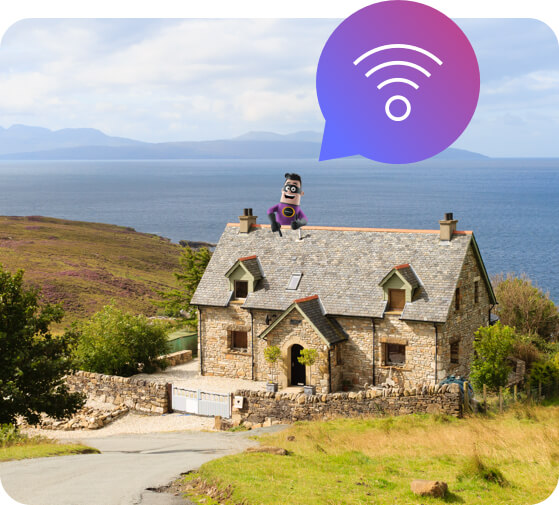If there’s one thing that’s clear in 2020, it’s this: it has never been more important for us all to stay connected. We believe that everyone should be able to keep in touch online, and enjoy everything that the internet has to offer. That’s why we’re committed to bringing speedy, reliable broadband to homes in every corner of the country!

We’re confident you won’t find similar packages for your home elsewhere.
We’ve got the technology to bring lighting-fast connectivity anywhere.
We work with a network of friendly and reliable local engineers across the UK.
Can’t get fibre? You could get a subsidy. We can give you a hand with that!
With over 10 years in the game, we really know super-fast broadband.
Your needs are always top priority for us. We’re here to help from start to finish.
Broadband is the term used to describe the connection between a device and the internet that lets you connect to the web, generally for things like streaming, online shopping, or browsing social media.
Whether you’re looking for a broadband deal for the first time, or you’re thinking about switching suppliers, there are various factors to think about when comparing providers and deals. Read our guide to discover everything you need to know about broadband and how to find the best broadband deal for you.
The main things you should be thinking about when deciding between broadband providers are:
Broadband comes in a variety of forms, and their availability usually depends on the provider you choose as well as your location. The most common types of broadband are:
Mobile broadband (3G or 4G): Mobile broadband is a service you can connect to at home and on the go. It’s convenient and doesn’t require a landline, but it can be expensive.
You’ll usually get a USB dongle to plug into your computer, or a special wireless box that just needs a power supply. There are no wires or cables and you can choose between pay as you go (PAYG), contract or SIM-only.
Satellite broadband: this is an option for people living in the few areas where a good ADSL, cable or fibre broadband connection isn’t available.
Many providers offer free gifts alongside their broadband tariffs, such as cashback, gift cards, vouchers or rewards cards. While these can be useful extras, they usually don’t have any bearing on the quality of service you’ll get from your provider.
Comparing broadband deals, even when you already have a tariff in place, is always a good idea. By shopping around, you may find a package that offers more than what you currently have but for a cheaper price, a higher download limit or a faster connection. Today’s broadband speeds are much higher than they used to be – in March 2016 the average download speed in the UK was 28.9Mbps, but that climbed up to 64.0 Mbps in November 2019.* Bearing this in mind, it might be easy to feel your current broadband connection is out of date. Switching your broadband provider can help you get faster download speeds at affordable prices, but you might also find a provider that offers superior customer service and even useful free gifts such as new gadgets or shop vouchers. *Data collected from Ofcom’s Fixed Home Broadband Speeds Report 2019, accurate as of May 2020
It usually makes sense to switch broadband at the end of your current contract, but it is possible to switch broadband provider whenever you like – you will usually just have to pay an early-exit fee. If you are tied into an existing contract and want to switch to a new provider, make sure that you check the potential saving against any early-exit fees, and make sure the switch is still worth it. If you are switching because the price of your broadband has gone up during your contract, you should be able to leave without a fee. Another way you can usually leave without paying a fee is if your existing provider isn’t giving you their minimum guaranteed speed.